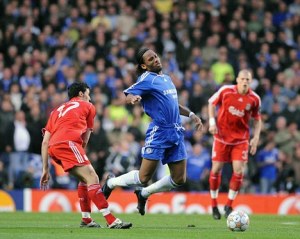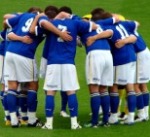 How do scouts, coaches, and trainers alike decide which players deserve to get their further attention and which don’t? This is a very pertinent question when you consider that it is often on the basis of the ‘expert’ eye that players are advanced in sport, or end up on the scrap-heap of untalented athletes. In a recently published article we investigated the link between expert observers ratings of a players skill-level and the playing behaviours, such as shots and carries, that young Bantam League Ice Hockey players showed during a game.
How do scouts, coaches, and trainers alike decide which players deserve to get their further attention and which don’t? This is a very pertinent question when you consider that it is often on the basis of the ‘expert’ eye that players are advanced in sport, or end up on the scrap-heap of untalented athletes. In a recently published article we investigated the link between expert observers ratings of a players skill-level and the playing behaviours, such as shots and carries, that young Bantam League Ice Hockey players showed during a game.
Let’s pick him!
Posted in Football, Joint Action, My own research, Science General, Sport Science
The sport hormone?
This article about our research into the biopsychology of team performance recently appeared in The Lancet (Diabetes and Endocrinology). Check it out!
A review argues that the hormone oxytocin affects athletic performance, because of its role in modulation of emotional and social processes important to team sports. Jill Jouret reports.
In elite sports, winning can come down to subtle aspects of performance. For example, an individual’s gestures and expressions of emotion can affect team performance and a contest’s outcome. A study of touch behaviour (eg, high-fives, chest bumps) among players in America’s National Basketball Association showed that teams who touched more had better season records. An investigation of football players’ body language after successful penalty kicks in World Cup and European Championship matches noted that specific celebratory behaviours were associated with the team eventually winning a shootout. Perhaps the emotional display by the elated kicker led to a positive emotion in a teammate, who struck the ball better on his attempt. Whether through touch or emotional expression, trust and goodwill communicated among players motivates the team toward higher achievement.
Posted in Football, My own research, Science General, Sport Science, Uncategorized
How fair is youth sport and is it helping our children? Understanding relative age effects in sport.
How can an apostle, a greek sculpture and his creation shed light on the (un)fairness that our children are surrounded by when they take part in their favourite sport. Here’s a great paper I think any parent, and trainers and coaches (not to forget sports scientist!) involved in youth sport development needs to read.

In youth sport development our children are faced with many in equalities which can sometimes have disastrous results on our children’s fun and motivation to participate. An important source of some of those inequalities is caused by the so-called relative age effect in sport. Get to know Matthew, Pygmalian, and Gallatea and understand where relative age effects in sport come from, why they should be overcome and prevented, and how we might be able to do this.
Posted in Football, My own research, Science General, Sport Science
Never give up …
Never give up! It’s more than just a platitude. In her extensive research, psychologist Angela Lee Duckworth found that more than IQ or talent or any other factor, the #1 predictor of a person’s success is their unflagging commitment to a long-term goal… in other words, their grit. This is not only true in education as Angela very nicely explains here – but certainly also in sport. Could it be that it is not necessarily technical and tactical ‘talent’ to develop ability and skill that determines who will be the football-player of the future – but that it is passion and perseverance for very long-term goals? Angela Lee Duckworth thinks so and to find out why… watch this TED-talk – and after read on here where Kenneth Barish presents a different view and explains how we can help our children become ‘grittier’.
https://embed-ssl.ted.com/talks/angela_lee_duckworth_grit_the_power_of_passion_and_perseverance.html
Posted in Football, Science General, Sport Science
Children have a right to lose – but praise does matter!
In a recent NY-Times Opinion it it is argued that losing is good for you. I think that educators should stop focussing on some end-result and start finding out how to make children happy – then learning will follow.
 In a recent Opinion in the NY-Times it is argued that losing is good for you. It is reasoned that in todays school and sport participation our children are constantly assured that they are winners by giving them trophies and prizes for every little achievement. This has now resulted in a multi-billion awards-industry in the US and Canada alone. The author’s message is that although awards can be powerful motivators, nonstop recognition does not inspire children to succeed. Instead, the author argues, it can cause them to underachieve. This message is not new, but is well documented in the psychological literature on extrinsic reward and implicit motivation, self determination theory, and the cognitive evaluation theory (Deci & Ryan, 1980, see also Deci, Koestner, & Ryan, 1999).
In a recent Opinion in the NY-Times it is argued that losing is good for you. It is reasoned that in todays school and sport participation our children are constantly assured that they are winners by giving them trophies and prizes for every little achievement. This has now resulted in a multi-billion awards-industry in the US and Canada alone. The author’s message is that although awards can be powerful motivators, nonstop recognition does not inspire children to succeed. Instead, the author argues, it can cause them to underachieve. This message is not new, but is well documented in the psychological literature on extrinsic reward and implicit motivation, self determination theory, and the cognitive evaluation theory (Deci & Ryan, 1980, see also Deci, Koestner, & Ryan, 1999).
Posted in Football, Science General, Sport Science
Getting too much of a good thing?! Young footballers showing signs of burnout.
Elite youth footballers are at risk of burnout before they leave school because of the perfectionist standards some feel coaches, parents and  team members demand of them. Dr Hill Dr Andrew Hill, lecturer in sports and exercise science in the University of Leeds’ School of Biomedical Sciences said some youngsters in professional football academies are showing signs of of chronic stress, exhaustion, and disillusion with their sport at a young age.
team members demand of them. Dr Hill Dr Andrew Hill, lecturer in sports and exercise science in the University of Leeds’ School of Biomedical Sciences said some youngsters in professional football academies are showing signs of of chronic stress, exhaustion, and disillusion with their sport at a young age.
“We need sport to be a positive experience for all participants. Sport can be used as a vehicle to develop life skills, a sense of self-esteem and quality relationships with others, but we know it can lead to disaffection, poor moral decision making and make people feel miserable about themselves. There is nothing necessarily positive about sport. It is about the environment that is created.”
Researchers studied the relationship between different types of perfectionism and burnout among 167 junior male footballers in eight academies and centres of excellence attached to English professional clubs.
Posted in Football, Science General, Sport Science
Diving in football: When and why cheating pays.
The findings of a human-based deception study fit perfectly with deception behaviours in the animal world, according to its authors. “They really are just a bunch of animals running around the sporting field – they have the same simple motivations of scoring a goal and are affected by the possible cost of their behavioural actions.”
 A study into deception by University of Queensland researchers shows football players are more likely to “take a dive” when a game is drawn and they are near the attacking end, in the hope of securing a penalty. Co-author Dr Robbie Wilson says the work grew out of studies into the evolution of deception. “One of the difficulties in studying deception in humans is it is hard to identify – by its very nature [deception] is supposed to go undetected,” he says.
A study into deception by University of Queensland researchers shows football players are more likely to “take a dive” when a game is drawn and they are near the attacking end, in the hope of securing a penalty. Co-author Dr Robbie Wilson says the work grew out of studies into the evolution of deception. “One of the difficulties in studying deception in humans is it is hard to identify – by its very nature [deception] is supposed to go undetected,” he says.
“We realised professional football gave us a unique opportunity [to look at human deception] as there are so many cameras recording the game it is obvious when a player is not touched and rolls around. This is then a clear case of someone trying to deceive another person.”
Read the article here and the scientific paper in PLos One, or read on.
Posted in Ecological Psychology, Football, Science General, Sport Science
‘Win at all costs’ a recipe for failure
 Coaching young athletes to enjoy their development rather than focusing on winning at all costs reduces the risk of burnout, according to research.
Coaching young athletes to enjoy their development rather than focusing on winning at all costs reduces the risk of burnout, according to research.
Victoria University Institute of Sport, Exercise & Active Living researcher Thomas Curran said athletes’ passion for their sport took one of two forms: ‘harmonious passion’, where the drive for success is not all-consuming, and comes from a place of want rather than need; and ‘obsessive passion’, where the drive for success is all-consuming and comes from a place of need rather than want.
Find the original article here, and the scientific paper here or read on.
Posted in Football, Science General, Sport Science
Yes, you can tell from his face what your dog is feeling
People can reliably read a dog’s facial expressions, suggesting humans are finely tuned to detect emotions even in other creatures. Behavioral scientists have long known that people can accurately read other humans’ emotions, but this study suggests our empathy extends to other members of the animal kingdom.
While a Ph.D student at Walden University in Florida, Tina Bloom worked with Harris Friedman and a dog named Mal at the Pennsylvania Department of Corrections. Mal, a 5-year-old Belgian shepherd and trained police dog, was subjected to a variety of stimuli, and the researchers took pictures of his reactions.
For instance, in one experiment the researchers praised him, trying to elicit a happy reaction; Mal looked at the camera with his ears erect and tongue lolling. Then they reprimanded him, and Mal’s ears flattened, he looked down and his eyes became mournful. They used a jack-in-the-box to surprise him; foul-tasting medicine to disgust him; nail trimmers to strike fear into his heart; and so on. One of the researchers even pretended to be a criminal, and Mal got angry. Then the team showed 50 volunteers photographs of these reactions, and asked them to categorize his emotions.
Read an article about here. Or read on … Read more ›
Posted in Joint Action, Science General
Team membership boosts performance
It is well documented that competition can affect performance and emotion in sport. However, our understanding of the comparative effects of individual and team competitions on performance and emotion is limited.
We also know little about emotion-based mechanisms underlying the effects of different types of competition on performance.
A study involved 64 participants completing a handgrip endurance task during time-trial, one-on-one, two-on-two and four-on-four competitions while self-report and possible corroborative physiological measures of enjoyment, anxiety and effort were assessed.
Results indicated that performance, enjoyment, anxiety and effort were greater in team competitions than in individual events. It was also concluded that the observed increases in performance were mediated by increased enjoyment and effort.
Read the published findings here. Or an article on it here, or read on. Read more ›
Posted in Football, Science General, Sport Science


